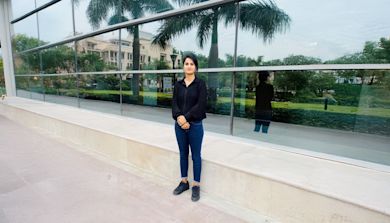Topics covered
- 5 min
- Published: 7 July 2025
- Updated: 24 July 2025
The benefits of a placement year are significant. The chance to gain real-world experience, build invaluable international connections, and boost your future employability makes these opportunities compelling for undergraduates and postgraduates alike. Whether you're an undergraduate eager to gain practical insights into your chosen field or a postgraduate considering an MBA abroad to explore the global market and broaden your career, this post will guide you on the practical steps needed to secure and prepare for a successful placement year. We’ll provide actionable advice for everything from the application process to maximising your experience, equipping you with the knowledge and confidence to navigate this exciting opportunity.
Laying the groundwork: essential preparation
Securing a coveted overseas placement year requires more than just enthusiasm; it demands careful preparation and a proactive approach. To increase your chances of landing a placement, it's vital to build a strong foundation.
Maintaining a strong academic record is paramount. Employers consistently seek candidates who demonstrate diligence, intellectual curiosity, and the ability to perform well under pressure. A solid academic foundation not only strengthens your application but also equips you with the theoretical knowledge necessary to excel in a professional setting. Universities often have minimum grade requirements for students to be eligible for a placement year, so consistent effort throughout your studies is key. It is also important to ensure your course selections align with placement year requirements and industry expectations. So research potential employers and the skills they value, and consult with your academic advisor to choose modules that develop these competencies.
Demonstrating relevant professional skills is equally crucial. Employers want to see that you possess the capabilities to contribute meaningfully to their organisation. You can actively develop these skills by gaining practical experience through internships, undertaking projects both within and outside your coursework and participating in extracurricular activities. These experiences provide invaluable real-world exposure, prove your ability to translate theory into practice and showcase skills such as teamwork, problem-solving, and initiative, valued across all industries.
It is also important to accurately identify a suitable placement year opportunity for you. Consider the following factors to ensure you find a placement that aligns with your goals:
Placement Duration: Placements typically last for a full academic year, but some may be shorter. Choose a duration that allows you to gain substantial and in-depth experience, enabling you to fully immerse yourself in the role and contribute meaningfully to the company.
Location: Decide where you want to undertake a placement year. The UK is a popular location for many students due to factors such as the relative ease of communication for English speakers and the well-established structure of placement year programs within its system. However, an overseas internship or placement in a different country may be worth more to you if you want to learn a different language or gain expertise in a specific international industry.
Industry: Select an industry that genuinely interests you and aligns with your long-term career aspirations. A placement year is an excellent opportunity to test-drive a potential career path, so choose wisely.
Company Culture: Research the company culture to ensure it's a good fit for your values and work style. A positive and supportive work environment can significantly enhance your placement experience and contribute to your overall well-being
Join the IDP student community
Connect with peers and student ambassadors to hear real experiences, tips, and advice about studying abroad.

The application process: standing out from the crowd
The application process for a placement year can be highly competitive, so it's crucial to present yourself in the best possible light and make a strong first impression.
Securing your placement year interview
Your cover letter and resume are the initial gateways to securing an interview, so ensure you tailor them to each application. Highlight the skills and experiences that align most directly with the role's requirements. This highlights your genuine interest in the company, demonstrates your commitment to the opportunity, and proves to the employer that you are a suitable candidate for the position and that you possess the specific skills and experience they are seeking. Use clear, concise language when crafting your resume and ensure that you proofread carefully.
Acquiring letters of recommendation
Secure effective letters of recommendation from professors or employers who know you well and can provide specific, insightful commentary on your abilities and work ethic. Strong letters of recommendation give you a significant edge over other applicants by providing credible, third-party validation of your skills, personality, and potential. Give your referees ample time to write thoughtful and detailed letters, and provide them with all the necessary information about the placement year and the skills the employer is looking for.
Honing your resume and cover letter
Beyond the formal application, showcase your active participation in industry events, workshops, and networking. These experiences demonstrate your proactive engagement with your chosen field, contribute to a well-rounded application, and provide valuable opportunities to learn from professionals and expand your knowledge. They also show employers that you're not just academically focused but also eager to connect with the industry and stay current with its trends.
Preparing for your placement year interview
Lastly, thorough preparation for interviews is crucial. Research the company extensively to learn about its history, mission, values, and current projects. This demonstrates your genuine interest and helps you formulate insightful questions. Anticipate common interview questions and prepare thoughtful answers, including examples that showcase your skills and experiences. Prepare thoughtful questions to ask the interviewer, as this demonstrates your curiosity and engagement. Practice your answers, body language, and overall presentation to project confidence and professionalism.
Logistics and finances: practical considerations
While preparing and applying for a placement year is essential, there are other practical considerations that require careful planning to ensure a smooth transition and successful experience.
You'll need to sort out both the logistics and your finances, which often involves navigating visa and work permit requirements. It's important to remember that these requirements vary significantly depending on your chosen destination. For example, if you're planning to undertake a placement year in the UK, you'll generally need a Student visa (specifically, a Student visa (formerly Tier 4 (General)) visa) that allows for work placements. Thoroughly research the specific requirements for your chosen country well in advance and initiate the application process early, as visa applications can be time-consuming. It's best to begin this process as soon as you've secured a placement offer.
You should also be prepared for various expenses associated with a placement year, including travel costs, accommodation, living expenses, and potentially course fees.
Explore potential funding opportunities to help subsidise these costs. Some companies offer stipends or salaries to placement students. You may also be eligible for government grants or scholarship schemes if you’re planning on a placement year in countries like the UK. Take your time and research the specific details and eligibility criteria thoroughly. If you're unsure where to start, such as which industry has the best opportunities, which destination to choose and what you need to get there, or even how to plan your finances, an overseas education consultant like IDP can provide guidance and resources, for free.
Before you depart, create a checklist of essential tasks to complete, such as arranging accommodation, opening a bank account, and registering with a doctor. Pack appropriately for the climate and workplace culture, and ensure you have suitable professional attire for your placement. Research the workplace culture of your host company to avoid any misunderstandings.
Tips for navigating your placement year
Your placement year is a valuable opportunity for professional and personal growth. To help you make the most of it:
Integrate effectively by proactively engaging with your colleagues, attending team meetings, and learning the company's processes and workflows.
Seek feedback regularly from your supervisor and colleagues to identify areas for improvement.
Take initiative by looking for opportunities to contribute and take on new challenges.
Network by building relationships with professionals in your field to expand your network.
Document your experiences to keep a record of your accomplishments and learnings, which will be useful for future job applications.
Adapt to workplace culture by being respectful of the company's culture and adapting your communication and behaviour accordingly.
Utilise resources provided by your host company, university, and IDP.
Get advice on how to start applying for your placement year
While the process of starting your placement year journey can sometimes feel overwhelming, you don’t have to do it alone. Through our partnerships with universities worldwide, IDP can connect you with courses abroad with integrated placement years, providing the search support you need to find your perfect placement opportunity. Our professional education counsellors will also guide you in making your decision, as well as navigating your application process as smoothly and successfully as possible. You’ll receive personalised advice on crafting compelling applications that truly showcase your unique strengths and preparing you to excel in interviews. They’ll cover help even up to h pre-departure preparation.
Conclusion
Landing a placement year is a significant achievement that can greatly enhance your future career prospects. By laying the groundwork, crafting a strong application, and carefully planning the logistics, you can increase your chances of securing a valuable placement. Remember to embrace the experience, seek feedback, and utilise available resources to make the most of your placement year.
Book a counselling session with IDP for personalised guidance and overseas education placements; our services are free. We can help you navigate the process and achieve your career goals.
One account for all your study abroad needs
Create your profile and unlock a wide array of features including personalised recommendations, fast-tracked applications and much more.











